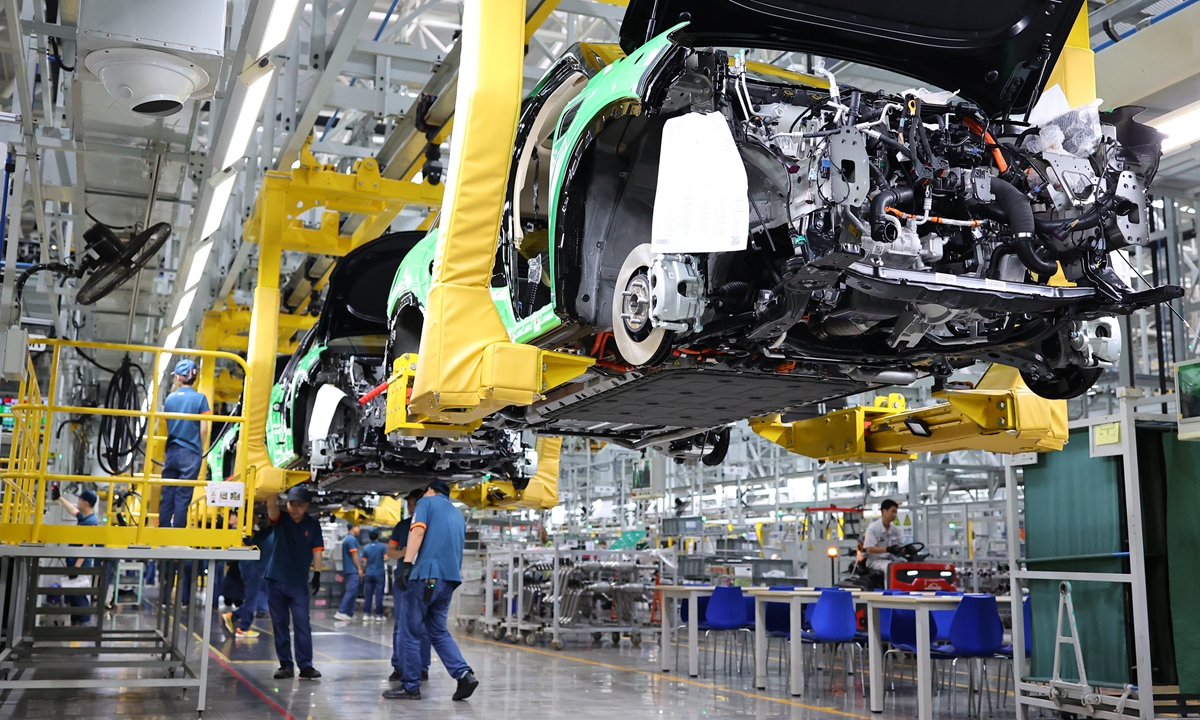
Workers assemble new-energy vehicles (NEVs) at a plant in Southwest China's Chongqing Municipality to fill overseas orders on September 21, 2023. NEV exports totaled 727,000 units in the first eight months of 2023, up 110 percent year-on-year, data from the China Association of Automobile Manufacturers showed. Photo: VCG
China overtook Japan as the largest auto exporter in 2023, a milestone for the internationalization of China's vehicle industry and bright spot in China's economic growth.
The achievement further proved China's competitiveness in the automotive industry and its recognition among consumers worldwide for its technological innovation and supply chain advantages, experts said.
Japan exported 4.42 million vehicles in 2023, according to data released by the Japan Automobile Manufacturers Association on Wednesday, The Japan Times reported. That compared with 4.91 million vehicles shipped from China, according to the China Association of Automobile Manufacturers (CAAM).
It's a milestone for the internationalization of China's automotive industry, indicating its growing presence in global markets, Zhang Xiang, director of the Digital Automotive International Cooperation Research Center of the World Digital Economy Forum, told the Global Times on Wednesday.
New-energy vehicles (NEVs) are a key force behind the overall growth, Zhang said. In 2023, China's exports of NEVs reached a record of 1.203 million, with year-on-year growth of 77.6 percent.
The Chinese vehicle industry, with its robust supply chain, has embraced innovation and effectively capitalized on the new-energy wave, Li Yong, a senior research fellow at the China Association of International Trade, told the Global Times on Wednesday.
"Chinese companies are at the forefront of patent filings and technological innovation in NEVs. They not only excel in innovative production but also have the advantage of scale and a complete industry chain," Li said.
After years of development, China has established a complete NEV industry system with seamless integration between the upstream and downstream sectors.
China's NEV-related public patents account for approximately 70 percent of the global total, while patents for internet-connected vehicles make up more than 50 percent of the world's total, the China Media Group reported.
CATL, a prominent Chinese battery maker, released its 2023 performance projection on Tuesday night, predicting a net profit of 42.5 billion yuan ($5.99 billion) to 45.5 billion yuan, which would be a year-on-year growth of 38.31 percent to 48.07 percent.
The company attributed its success to the implementation of new technologies and products, as well as accelerated expansion into overseas markets.
According to custom data compiled by the CAAM, Russia and Spain were among the top 10 destinations for China's auto exports. Belgium, Thailand and the UK were the top three NEV export destinations.
China's technological advantages, coupled with its cost-competitiveness, position it as a formidable player in the global vehicle market, Zhang said.
With the largest automotive industry chain in the world, China's vehicles benefit from lower production costs, giving them a significant competitive edge in overseas markets, Zhang added.
Experts are optimistic about China's auto export outlook in 2024 and anticipate a deeper integration into foreign markets with the establishment of localized channels and production facilities.
Chinese electric car maker BYD in December announced plans to build a manufacturing plant for NEVs in Szeged, Hungary, accelerating the company's expansion in Europe.
"The rapid growth in NEVs will directly drive overall exports, benefiting the optimization of China's economic structure and high-quality development," Liu Chunsheng, a professor at the Central University of Finance and Economics, told the Global Times on Wednesday.
Liu said that the vehicle industry chain is long and has a wide range of influence. The growth in NEV exports will promote exports of related components, raw materials and batteries.
The trade data showed that China's export products hold solid competitive advantages, with tech-driven products serving as new growth engines for exports.
The total export value of China's new tech-intensive green trio - solar batteries, lithium-ion batteries and electric vehicles - surged 29.9 percent to 1.06 trillion yuan in 2023, exceeding the level of 1 trillion yuan for the first time, the Xinhua News Agency reported.




